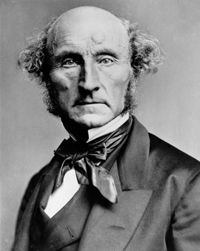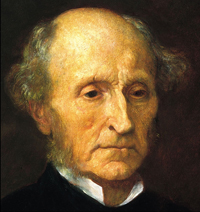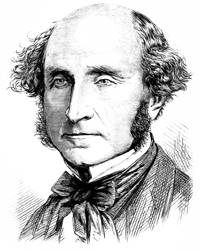| Profiles > Philosophy > John Stuart Mill | |||||||||||||||||
| John Stuart Mill | |||||||||||||||||
|
|||||||||||||||||
|
By his late teens, Mill spent many hours editing Jeremy Bentham’s manuscripts, and threw himself into the work of the philosophic radicals (still guided by his father). He also founded a number of intellectual societies and began to contribute to periodicals, including the Westminster Review (which was founded by Bentham and James Mill). In 1823, his father secured him a junior position in the East India Company, and he, like his father, rose in the ranks, eventually taking his father's position of chief examiner. This intensive study, however, had an injurious effect on Mill's mental health and state of mind. At the age of twenty, he suffered a nervous breakdown. In his Autobiography, he claims that this was caused by the great physical and mental arduousness of his studies, which had suppressed any feelings he might have developed normally in childhood. Nevertheless, this depression eventually began to dissipate, as he began to find solace in the Memoires of Jean-François Marmontel and the poetry of William Wordsworth. |
||||||||||||||||
|
Mill did not study at the Oxford/Cambridge universities, as he refused to subscribe to the Thirty-Nine Articles of the Church of England. Instead, he followed his father, and went on to work for the East India Company until 1858. He attended University College, London, and went to hear the lectures of John Austin, the first Professor of Jurisprudence. He was elected Foreign Honorary Member of the American Academy of Arts and Sciences in 1856. In 1851, Mill married Harriet Taylor after 21 years of friendship. Taylor was married when they met and brilliant in her own right. She was a significant influence on Mill's work and ideas during both friendship and marriage. Mill's relationship with Harriet Taylor reinforced his advocacy of women's rights. He cites her influence in his final revision of On Liberty (1859), which was published shortly after her death. Taylor died in 1858 after developing severe lung congestion, after only seven years of marriage to Mill. |
|||||||||||||||||
|
|||||||||||||||||
|
|||||||||||||||||
His most well-known and significant works are as follows: A System of Logic (1843) is considered to be Mill’s most comprehensive and systematic philosophical work, which presented his thoughts on inductive logic and the shortcomings of the use of syllogisms (arguments derived from general principles, in which, two premises are used to deduce a conclusion) to advance deductive logic. In this work, he formulated the five principles of inductive reasoning that are known as Mill's methods. This work is important in so far as it outlines the empirical principles Mill would use to justify his moral and political philosophies. Theory of Liberty (1859) caused the greatest controversy of his career. It has since become a classic of liberal thought. Written and developed in close collaboration with his wife, Harriet Taylor, Mill addresses the nature and limits of the power that can be legitimately exercised by society over the individual. Mill states that it is acceptable for someone to harm himself as long as he is not harming others. He does argue, however, that individuals are prevented from doing lasting, serious harm to themselves or their property by the harm principle. Because no one exists in isolation, harm done to oneself may also harm others, and destroying property deprives the community as well as oneself. Mill further argues that despotism is an acceptable form of government for those societies that are "backward", as long as the despot has the best interests of the people at heart, because of the barriers to spontaneous progress. Mill's most significant impact was in promoting Utilitarianism. This philosophy argues that moral actions increase happiness, and thus the ethics of decision are determined primarily according to the decision's outcome -- this philosophical approach is sometimes called consequentialism. Although Mill's utilitarian ethics emphasizes happiness as a moral good, he was not a simple hedonist. The goal of an action is not just to maximize happiness for oneself, but for others as well. Stealing money from a wealthy man, for example, does not maximize happiness because it harms the victim of the theft. Mill emphasized that happiness could be gleaned from hard work and intellectual pursuits, and claimed that people could attain happiness regardless of their education or intellectual prowess. | |||||||||||||||||
| "… it is better to be a human being dissatisfied than a pig satisfied; better to be Socrates dissatisfied than a fool satisfied. And if the fool, or the pig, is of a different opinion, it is because they only know their own side of the question." |
|||||||||||||||||
|
Mill extensively wrote on what constitutes a good life. He argued that people should pursue simple pleasures that bring about true happiness, not just contentment. He argued that freedom and individuality were key ingredients in the recipe for happiness, and emphasized that the oppression of racial minorities and women limited their opportunities to achieve happiness. Mill believed that pleasure was a primary human motivator that could also be used to reinforce behavior. In his early years, Mill’s economic position was one of free trade and a utilitarian society. He did, however, favor government intervention when they supported utilitarian principles. Mill published the Principles of Political Economy in 1848, which quickly became one of the most widely read works on economics of its time. Later in life, Mill modified his work with a more socialist bias, arguing in favor of abolishing the wage system and replacing it with cooperative wage earning. The Subjection of Women is one of the last subjects of Mill’s well-known work in the history of feminism. Mill saw women's issues as important and began to write in favor of greater rights for women. In his article, "The Subjection of Women" (1861), Mill attempts to prove that the legal subjugation of women is wrong and that it should give way to perfect equality. He talks about the role of women in marriage and how he felt it needed to be changed. There, Mill comments on three major facets of women's lives that he felt were hindering them -- society and gender construction, education, and marriage. Mill is also famous for being one of the earliest and strongest supporters of ever greater rights for women. He felt that the oppression of women was one of the few remaining relics from ancient times, a set of prejudices that severely impeded the progress of humanity. Considerations on Representative Government -- Mill's major work on political democracy, Considerations on Representative Government, defends two fundamental principles, extensive participation by citizens and enlightened competence of rulers. Mill believed that the incompetence of the masses could eventually be overcome if they were given a chance to take part in politics, especially at the local level. Mill is one of the few political philosophers ever to serve in government as an elected official. In his three years in parliament, he was more willing to compromise than the "radical" principles expressed in his writings would lead one to expect. Principles of Political Economy -- In 1848, Mill published Principles of Political Economy, which soon became the most important text of his time. The book examines the conditions of production, namely labor and nature. Following Ricardo and Malthus, he emphasizes the possibility of change and social improvement, and examines environmental protection needs. For these to be obtained, he considers a limitation of both economic growth and population growth, as the polis itself is indispensable. Furthermore, Mill argued in favor of worker-owned cooperatives, which clearly reflect his views. Mill was highly productive throughout most of his life. He published his first article as young as 17. Other major works by Mill are as follows: Essays on Bentham (1838) and Coleridge (1840) Essays on Some Unsettled Questions in Political Economy (1844) Examination of Sir William Hamilton’s Philosophy (1865) August Comte and Positivism (1865) England and Ireland (1869) Autobiography, posthumously, by Helen Taylor (1873) |
|||||||||||||||||
|
Credits
http://en.wikipedia.org/wiki/John_Stuart_Mill http://www.econlib.org/library/Enc/bios/Mill.html http://www.iep.utm.edu/milljs/ http://www.britannica.com/EBchecked/topic/382623/John-Stuart-Mill http://www.biography.com/people/john-stuart-mill |
|||||||||||||||||











